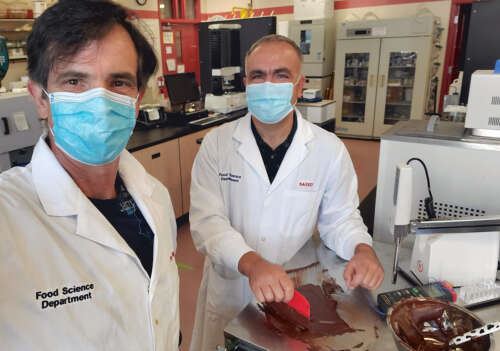The cost of filling Easter baskets with chocolate is set to soar in the coming years, economists say. But a University of Guelph food scientist says he and colleagues are working on solutions.
Dr. Alejandro Marangoni is a professor in the Department of Food Science and the Canada Research Chair in Food, Health and Aging. He researches the development of new structured emulsions to take the place of trans fats, saturated fats, and palm oil in foods.

Marangoni notes the cost of chocolate is rising because of long-term shortages of cocoa beans in West Africa, where the majority of the world’s cocoa is grown. Extreme weather and climate change in those regions have led to crop failures of cacao trees.
“Cocoa butter is one of the most expensive fats in the world and current trends in the cocoa butter market suggest further rises in prices because of shortages and increasing demand,” he says. “That’s why finding practical alternatives is necessary.”
Marangoni is working on several solutions, including one that could transform industrial chocolate production, by eliminating multi-step “tempering,” a costly and lengthy process of repeatedly heating and cooling melted chocolate in large machines to create the ideal structure.
“We can lower chocolate prices due to our invention of a simple method to temper chocolate by adding a specific phospholipid, which skips the use of complex tempering processes,” he says.
The technique is described in this 2021 research study, with further insights featured in a recently published research paper.
His team has also been developing cocoa butter alternatives for the chocolate industry that have similar textures and melting points as chocolate but do not contain dangerous trans fats.
The team uses non-cocoa sources, such as shea butter, oils from marine algae and palm oil mid fractions.
Marangoni says that efforts to find alternatives to expensive cocoa butter have been underway for years but have accelerated as the cocoa supply dwindles and demand increases.
“It’s all about economics and futures,” he says. “The price of cocoa and cocoa butter has finally reached that critical point where cocoa butter alternatives are necessary.”
Marangoni is available for interviews.
Contact:
Dr. Alejandro Marangoni
amarango@uoguelph.ca
